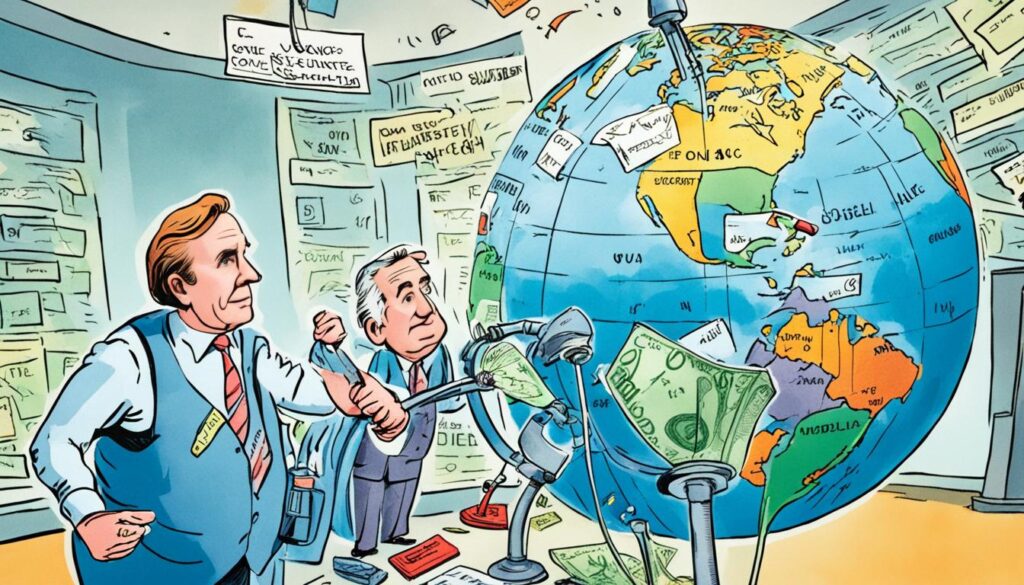Inflation trends are key in how the investment scene looks. It’s important to know how inflation changes your investments. Inflation means prices of things go up quickly over time. This shows how the value of what you invest in drops and prices go up.
High inflation weakens your money’s power to buy things. The same cash will get you less goods and services. It also affects how well your investments do. They must grow faster than inflation for you to keep up.
Many things like how much money is out there and economic productivity can speed up inflation. The Federal Reserve is the top bank in the U.S. It aims for a 2% inflation rate. This helps keep prices steady and support a strong economy.
Key Takeaways:
- Inflation is a sustained increase in prices over time.
- High inflation erodes the purchasing power of money.
- Investments need to outpace inflation to maintain the same standard of living.
- The rate of inflation is influenced by factors such as money supply and productive output.
- The Federal Reserve aims for an inflation rate of 2%.
Understanding Inflation and its Impact on Investments
Inflation is very important for our economy and what happens with our money. Knowing how it’s measured and what causes it is key for smart investing. This knowledge helps us protect what we’ve earned and what we can buy.
Measuring Inflation with Inflation Data
The Consumer Price Index (CPI) shows how much goods and services cost on average. In the US, living costs went up by 6.2% in 2022, showing high inflation.
Inflation happens when more people want goods or services than what’s available. This makes prices go up, making our money buy less. It also brings down the value of some investments, like bonds, and can make stock prices jump up and down.
The Impact of Economic Inflation on Investments
Inflation takes away the buying power of money and lowers the value of some investments.
Too much inflation can harm how much we make from certain investments. This makes bonds and the interest they pay less appealing. Stocks are also less stable in high inflation times. So, it’s important to think about what inflation might do to how we invest.
Investors should watch the inflation rates closely. Thinking about how inflation could affect their investments is wise. Diversifying, or spreading out investments, can help shield them from inflation’s downsides.
Effect of Inflation on Different Asset Classes
When inflation goes up, each kind of investment can react differently. It’s important to see how different asset types may change in value. This helps know what to watch for if the cost of living goes up.
1. Liquid Assets like Cash: Cash is hit hard by inflation. With prices climbing, the worth of cash falls. It grows slower than inflation, so the money you have can buy less over time.
2. Illiquid Assets like Real Estate and Stocks: Real estate and stocks can be good against inflation. They might grow in value or give you income, keeping your buying power safe. But their performance changes with the market and other reasons.
3. Inflation-Protected Securities: Inflation-protected bonds are a safe choice. They adjust for inflation. This keeps your investments from losing value as prices go up.
4. Commodities: Things like oil and gold can do well as inflation rises. Their value often goes up too, making them an option to maintain wealth.
Knowing how inflation affects investments helps with smart planning. Diversifying your portfolio, considering safe securities, and looking at past investment performance related to inflations can help. This way, investors can lessen inflation’s negative impact.
How Governments Manage Inflation
Governments use different tools and strategies to handle inflation. They aim to keep prices steady and the economy growing. We’ll look into what causes inflation and how governments work to control it.
Inflation Factors
Inflation comes from a mix of factors. Demand-pull inflation happens when people want more than what’s available. Businesses then raise their prices to match. Cost-pull inflation rises when making goods costs more. This makes finished products more expensive for us.
Inflation Management
Giving inflation the slip needs a full plan. One tactic is for governments to set rules on wages and prices. This can slow inflation. But, it might also cause job cuts or even a recession. A more common method is monetary policy. This involves playing with interest rates to make it harder or easier to borrow money. By doing this, they hope to balance inflation.
Monetary Policy
Monetary policy is key in fighting inflation. Central banks keep an eye on the economy to judge when to tweak interest rates. Raising rates makes borrowing money more costly. This can slow down spending and help fight inflation. On the flip side, lowering rates can encourage spending but might drive up inflation.
“By adjusting interest rates, central banks can influence borrowing costs, which, in turn, impact consumer spending and investment.”
A Visual Representation of Inflation Management
| Inflation Management Tools | Advantages | Disadvantages |
|---|---|---|
| Wage and price controls | – Can help control price increases in the short term | – May lead to job losses and economic recession |
| Monetary policy | – Gives central banks flexibility to adjust interest rates | – Impact on the overall economy and financial markets can be complex |
This table shows the good and bad of wage and price controls and monetary policies. Policymakers need to weigh their options. They must think through the effects of their choices on the economy.

Image: Illustration representing the factors and tools involved in managing inflation.
Learning about inflation’s causes and how governments handle it can guide investment choices. This insight is key for investors. It helps them protect their portfolios from inflation’s negative effects.
How Inflation Impacts Borrowers and Lenders
Inflation has both positive and negative effects on borrowers and lenders. It changes how we handle debt and investments. Let’s dive into how inflation impacts each group.
Inflation Effects on Borrowers
Before inflation hits, borrowers might find a silver lining. Their debts are worth less as prices go up. So, they can use fewer dollars to pay back what they owe. This is only good, though, if their incomes also get bigger alongside.
But, if wages don’t rise with inflation, it’s a tough spot for borrowers. Affording things becomes harder. This includes paying back loans.
Inflation Impact on Lenders
Lenders see a plus side in inflation too. They get to charge more in interest as prices rise. Central banks hike interest rates during high inflation. This helps prevent the economy from overheating. For lenders, it means more money in their pockets.
But if interest rates don’t match inflation, lenders can lose out. Their earnings might not stand up against the price jumps in the market. It’s a balance that must be watched closely.
Everyone, borrowers and lenders, needs to think about how inflation affects money matters. Knowing the ups and downs of loan paybacks, wages, and interest rates can guide smart choices.
Looking at how interest rates impact lenders is clear in the table below:
| Scenario | Annual Inflation Rate | Interest Rate | Effective Interest Rate (Adjusted for Inflation) |
|---|---|---|---|
| Low Inflation | 2% | 3% | 0.98% |
| High Inflation | 5% | 7% | 1.67% |
In low inflation times, what lenders really earn is less than the interest advertised. But when prices surge, what they actually make can be much more. This shows how real returns can change for lenders in different inflation scenarios.
In conclusion, inflation shakes up the world of borrowers and lenders. Borrowers win if they owed money before inflation hits and see their wages rise. Lenders can score with higher interest rates. But, if those rates and wages don’t keep up with inflation, both groups can lose spending power.

Protecting Your Investments from Inflation
Dealing with inflation is key to keeping your money safe. Luckily, there are ways to protect what you’ve worked hard for. Here are some tactics to fight the impact of rising prices:
Diversify Your Investment Portfolio
Putting money in different places is smart to reduce inflation’s hit. Spread your cash across stocks, bonds, real estate, and more. This mix helps you gain from assets that can beat inflation and offer steady gains.
Invest in Inflation-Protected Securities
Treasury Inflation-Protected Securities (TIPS) guard your money from inflation. Their returns go up with inflation, keeping your investment’s worth. TIPS let you keep buying power, even when inflation cuts into other types of investments.
Monitor Savings and Retirement Accounts
Watching your savings and retirement funds is crucial. Make sure they adjust for inflation. Choosing accounts that earn more than inflation safeguards your money’s real value.
Keep Pace with Inflation through Wage Increases
It’s essential your income rises with inflation rates. Asking for better pay or changing jobs can help. Always look for ways to make more money to stay ahead of inflation.
Getting advice from an expert in inflation protection is wise. They can guide you through economic ups and downs. They’ll help find investments that fight inflation and match your needs.
By using these tactics and staying on top of inflation and economic info, you can keep your money safe. And secure your future financially.
| Strategies for Inflation Protection | Benefits |
|---|---|
| Diversify your portfolio | Reduces the impact of inflation on your investments |
| Invest in inflation-protected securities | Maintains the purchasing power of your assets |
| Monitor savings and retirement accounts | Ensures your funds are inflation-adjusted |
| Keep pace with inflation through wage increases | Safeguards your income against rising prices |
Conclusion
Inflation is important to think about when planning your investments. It affects different types of investments in different ways. The main worry is that your money might not buy as much over time. But, with the right plans, you can lessen this risk and protect what you’ve invested.
To fight the impact of inflation, it’s smart to have a diverse portfolio. This means putting your money in various places, like stocks, bonds, and real estate. By doing this, you lower the risk of losing money during times of inflation. This mix can help keep your investments safe against rising prices.
Choosing investments that are safe from inflation is another powerful way to protect your money. For example, Treasury inflation-protected securities (TIPS) go up with inflation, keeping your investment safe. It’s also crucial to make sure you keep making more money and saving more over time. This will help your money grow along with the cost of living.
To beat inflation, understanding and using the right strategies are key. This way, you can keep the value of your investments even as prices go up. Always keep planning for inflation in mind when managing your money. This approach can lead to achieving your financial dreams over the long run.
FAQ
What is inflation?
Inflation means prices are increasing across the board. It’s a sign that the value of money is dropping. This means we can buy less with the same amount of money.
How is inflation measured?
We measure inflation by looking at how much goods and services cost over time. The Consumer Price Index (CPI) helps track these changes.
What was the inflation rate in the US in 2022?
The US saw prices go up by 6.2% in 2022. This means things cost a lot more than they did in 2021.
How does inflation impact investments?
Inflation lowers the value of money, hitting cash savings and fixed earnings. It can also make stock market prices swing a lot, causing uncertainty.
How can different asset classes be affected by inflation?
Cash is hit hard by inflation; its value drops quickly. However, real estate and stocks can often keep up with, or even beat, inflation. Commodities tend to do well when inflation is high.
How do governments manage inflation?
Governments can try to control inflation through policies. They might set limits on how much wages or prices can go up. They also adjust the money supply to try and keep inflation in check.
What is the impact of inflation on borrowers and lenders?
For those who owe money, inflation can be good news if they get paid more. This means their debt is worth relatively less. On the other hand, lenders make more money when they lend at high-interest rates during inflation.
What strategies can be used to protect investments from inflation?
To guard against inflation, invest in things like TIPS that protect against rising prices. Diversify across asset classes. It’s also important to make sure your income and savings grow as fast as prices do.
How does inflation impact investment planning?
Inflation is a big consideration when making an investment plan. Knowing how it affects investments and using the right strategies can help shield your money from loss.


